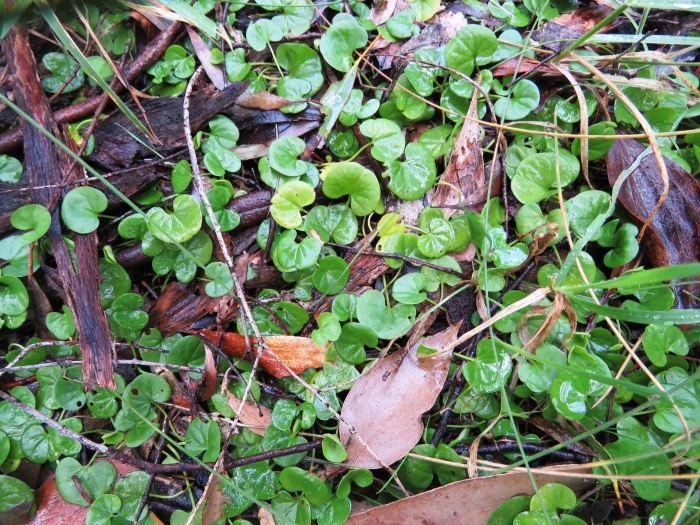Kidney Weed
(Dichondra repens)
Kidney Weed (Dichondra repens)
/
/

Elspeth Swan
CC BY 4.0
Image By:
Elspeth Swan
Recorded By:
Copyright:
CC BY 4.0
Copyright Notice:
Photo by: Elspeth Swan | License Type: CC BY 4.0 | License URL: http://creativecommons.org/licenses/by/4.0/ | Rights Holder: Elspeth Swan | Publisher: iNaturalist | Date Created: 2020-09-26T13:10:11-07:00 |



































Estimated Native Range
Summary
Dichondra repens, commonly known as Kidney Weed, is an evergreen perennial herb native to open woodlands, grasslands, and scrub areas in Australia, New Zealand, and the Western Pacific. It typically forms dense mats with a creeping habit, rooting at the nodes, and is often found in moist, well-drained soils. The plant reaches a height of 2 inches (5 cm) with indefinite spread due to its creeping nature. The leaves are kidney-shaped to circular, measuring 0.5 to 2.5 cm (0.2–1 in) long, and the tiny yellowish-green flowers appear throughout the year, peaking from September to February, especially in November. The fruit is a hairy, two-lobed capsule.
Kidney Weed is valued for its low maintenance and ability to form a dense carpet, making it an excellent lawn substitute or groundcover, particularly in shaded areas. It is also used in hanging baskets and as a spiller in container plantings due to its trailing habit. In cultivation, it thrives in partial to full shade, requires moderate watering, and prefers well-drained soils. While it can tolerate a range of soil types, it does best in rich, loamy soils. Dichondra repens can be invasive outside its native range, so it is important to consult local guidelines before planting.CC BY-SA 4.0
Kidney Weed is valued for its low maintenance and ability to form a dense carpet, making it an excellent lawn substitute or groundcover, particularly in shaded areas. It is also used in hanging baskets and as a spiller in container plantings due to its trailing habit. In cultivation, it thrives in partial to full shade, requires moderate watering, and prefers well-drained soils. While it can tolerate a range of soil types, it does best in rich, loamy soils. Dichondra repens can be invasive outside its native range, so it is important to consult local guidelines before planting.CC BY-SA 4.0
Plant Description
- Plant Type: Herb
- Height: 0.2-0.3 feet
- Width: 3-5 feet
- Growth Rate: Rapid
- Flower Color: N/A
- Flowering Season: Spring, Summer
- Leaf Retention: Evergreen
Growth Requirements
- Sun: Full Sun, Part Shade
- Water: Medium
- Drainage: Fast, Medium, Slow
Common Uses
Bank Stabilization, Bee Garden, Bird Garden, Butterfly Garden, Deer Resistant, Drought Tolerant, Groundcover, Hummingbird Garden, Low Maintenance, Potted Plant
Natural Habitat
Open woodlands, grasslands, and scrub areas
Other Names
Common Names: Lawn Leaf , Mercury Bay Weed , Tom Thumb , Creeping Dichondra
Scientific Names: Dichondra repens , Dichondra repens var. repens , Steripha reniformis
GBIF Accepted Name: Dichondra repens J.R.Forst. & G.Forst.